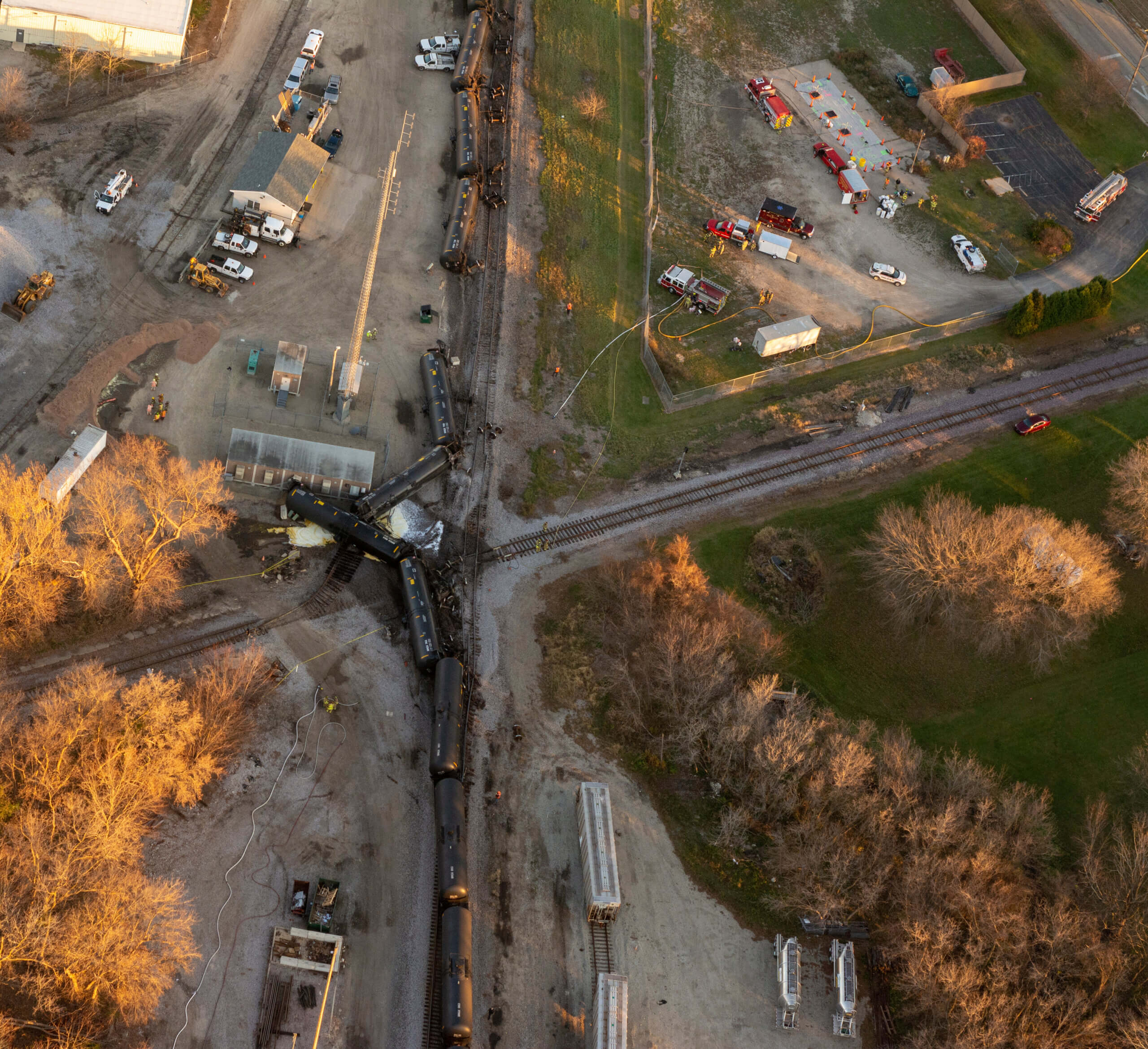
Trains have long been celebrated as a relatively sustainable mode of transport, championed for their efficiency and reduced carbon footprint in comparison to other freight and passenger transport methods. However, while the overall environmental footprint might be less onerous, one element that often evades the public eye is the potential environmental devastation caused by train derailments.
Though not a daily occurrence, these accidents do happen and when they do, the effects can be far-reaching and long-lasting. Train derailments can wreak havoc on surrounding ecosystems, with impacts ranging from contamination of soil and water bodies to the decimation of local flora and fauna, and even significant contributions to air pollution.
The purpose of this article is not to demonize the rail industry, but to uncover the hidden costs of derailments and underline the importance of robust safety measures, effective emergency response plans, and rigorous environmental protection policies.
Background Information
Recent environmental catastrophes like the East Palestine Ohio train derailment has put the rail industry on notice. The railway system, ever since its inception, has been a linchpin of industrial development and economic growth. Trains transport millions of tons of cargo and countless passengers daily, acting as arteries that connect cities, countries, and even continents.
Despite the advent of other faster modes of transport, trains remain vital due to their high cargo capacity, fuel efficiency, and lower carbon emissions per ton-mile compared to trucks and airplanes. However, these benefits come with certain risks, a prominent one being train derailments.
Train derailments occur when a train runs off its rails, which can be caused by a multitude of factors including track defects, mechanical failures, operator errors, and even extreme weather conditions. Advancements in modern technology help prevent these disasters, but the Federal Railroad Administration’s (FRA) Office of Safety Analysis reports hundreds of train derailments each year.
Environmental Impact
The environmental impact of train derailments are both immediate and long-term, sometimes lingering around for years after the accident. The immediate environmental effects of a train derailment largely depend on the nature of the cargo involved. Derailments of freight trains carrying oil or chemicals can lead to significant spills. Such spills can contaminate the surrounding soil and infiltrate water bodies, damaging local ecosystems.
Physical damage to the immediate surroundings is another instantaneous result. Land deformation can lead to altered drainage patterns or disruption of local habitats. Moreover, the derailment and subsequent clean-up operations can also disturb or destroy local flora and fauna.
In cases where the derailed train catches fire, the resultant air pollution can be a significant immediate environmental concern. Such fires, particularly those involving oil or chemicals, release a plethora of hazardous pollutants into the atmosphere, contributing to local and regional air quality degradation.
Beyond the immediate fallout, train derailments can also have long-term environmental impacts. For example, soil and water contamination from a chemical spill can persist for years, posing ongoing threats to wildlife and potentially entering the food chain. The cleanup of such contamination is often a complex and lengthy process, and in some cases, complete restoration might be unattainable.
The long-term effects of a derailment on local ecosystems can be devastating. Altered habitats can impact local biodiversity, leading to shifts in species populations and disruptions of food chains. This ecological imbalance can take years to restore, and in some cases, certain species might never fully recover.
Train derailments can also contribute to climate change. The combustion of spilled oil or chemicals during a fire releases greenhouse gases, including carbon dioxide and methane. While a single derailment might not significantly influence global climate patterns, the cumulative effect of multiple incidents can contribute to the overall greenhouse gas emissions.
Policy and Regulation
Preventing train derailments depends heavily on transportation policy and regulations. They form the backbone of the safety framework for rail transportation and can help strike a balance between operational efficiency and environmental responsibility.
In America, the FRA enforces a broad set of safety regulations designed to prevent derailments. These regulations cover everything from track maintenance standards and railcar inspection procedures to operator training requirements.
Further, regulations specific to the transport of hazardous materials, like the U.S. Department of Transportation’s Pipeline and Hazardous Materials Safety Administration (PHMSA), are in place to ensure the safe and secure movement of these substances. These regulations mandate stringent packaging and labeling standards, set limitations on the quantities and types of hazardous materials that can be transported together, and maps out emergency response procedures.
Personal Injury
While this article touches on the environmental implications of train derailments, it’s critical to recognize their potential human cost. Derailments, especially those in populated areas, can result in severe injuries, loss of life, and psychological trauma.
The scale and severity of these injuries depend largely on the circumstances of the derailment, including the train’s speed at the time of the incident, the nature of the cargo, and the proximity of people to the site of the accident. In derailments involving hazardous materials, there’s an additional risk of exposure to toxic substances.
Depending on the nature of the substance, short-term exposure can cause respiratory problems, skin and eye irritation, and more severe acute health issues. Long-term exposure effects can be even more dangerous, potentially leading to chronic health conditions and diseases.
Legal Advice
If the injuries and health problems you experience from a train derailment are significant, you may be able to seek compensation. Deldar Legal has a skilled team of train accident attorneys who can handle your situation with tender care and expertise.
The physical and psychological impact of train derailments should not be underestimated. Survivors can experience post-traumatic stress disorder (PTSD), anxiety, depression, and other mental health issues. Feel free to call us at (844) 335-3271 or contact Deldar online and setup a complimentary case evaluation.
Tagged with: catastrophic injuries, train derailments, transportation disaster
Posted in: Train Accidents
